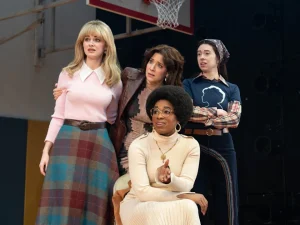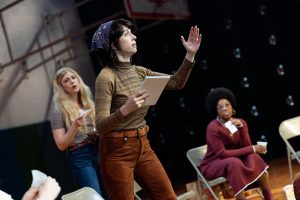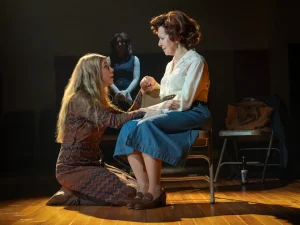“You want a revolution, but you want it on your terms, and you don’t want to have to give anything up.”
With that sharp line, Liberation, the riveting new play by Bess Wohl, pierces straight to the heart of the feminist struggle—then and now. Set against the backdrop of the 1970s women’s liberation movement, Wohl’s script toggles deftly between past and present, laughter and heartbreak, idealism and the uncomfortable truth of compromise.

Audrey Corsa,Kristolyn Lloyd, Irene Sofia Lucio, Adina Verson Photo by Little Fang
The story unfolds through Lizzie (the luminous Susannah Flood), who breaks the fourth wall to revisit the life of her mother—a passionate activist who once founded a consciousness-raising (CR) group. What follows is part memory play, part reckoning, as Lizzie attempts to excavate not just her mother’s past, but the elusive meaning of liberation itself.

Adina Verson, Susannah Flood, Kristolyn Lloyd Photo by Little Fang
Wohl assembles a vibrant, flawed, and deeply human ensemble of women, each grappling with the era’s promises and limitations. Audrey Corsa plays “Dora,” a beautiful, ambitious receptionist, treated more as body than voice. Adina Verson offers a grounded, tender portrayal of a gender-nonconforming writer. Kristolyn Lloyd’s Celeste—home to care for a dying mother—is guarded but observant, navigating a world that rarely sees her fully. She becomes entangled with Irene Sofia Lucio’s fiery Isidora, a radical Sicilian immigrant who burns bright with conviction. Betsy Aidem’s Margie, the group’s lone traditional housewife, later steps into a maternal role that’s both nurturing and nostalgic.

Irene Sofia Lucio, Kristolyn Lloyd Photo by Little Fang
The cast is uniformly excellent. Susannah Flood captivates with warmth and humanity as Lizzie, drawing us into a personal rabbit hole where questions outnumber answers. Audrey Corsa articulates the cost—and power—of being beautiful in a man’s world. Irene Sofia Lucio’s Isidora embodies unflinching rebellion, growing in complexity with every scene. But it’s Kayla Davion as Joanne who nearly steals the show: a Black mother of four who storms in from the margins to challenge the self-indulgent undercurrents of white feminism with devastating precision.

Kayla Davion, Charlie Thuston Photo by Little Fang
Charlie Thurston, the play’s only man, appears as Bill—Lizzie’s father—and becomes a stand-in for every man adjacent to the movement. His performance is nuanced and essential.

Susannah Flood, Charlie Thuston Photo by Little Fang
Set by David Zinn evokes the past with a wink and a gut-punch: bright primary-colored gym mats transport us back to high school—both literal and emotional. Cha See’s subtle lighting shifts, paired with Palmer Hefferan and Ben Tuppin-Brown’s evocative sound design, root us firmly in the era. And Whitney White’s direction is so fluid, so invisible, that it’s easy to forget you’re watching something meticulously constructed.

Susannah Flood, Betsy Aidem Photo by Little Fang
Wohl’s writing is sharp, witty, and emotionally resonant. The dialogue crackles with intelligence and insight, holding a mirror up to the unfinished work of feminism today. Liberation tackles misogyny, internalized homophobia, domestic abuse, gender norms, and the need for true intersectionality with a bold, unflinching eye.
In the end, Liberation doesn’t offer neat conclusions—because there are none. Instead, it leaves us with a necessary question: What does liberation mean to each of us, and what are we truly willing to give up to claim it?
Liberation: James Earl Jones Theatre, 136 West 38th Street, through January 8. 2026


AloJapan.com